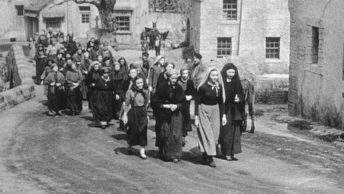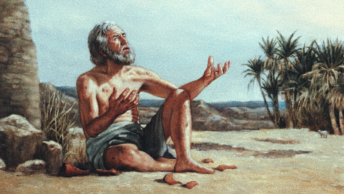No one likes complainers. We all try to avoid them. As they approach us we begin to wonder what they might have to complain about, this time, and how long the conversation will take.
Well, the prophet Jeremiah complained a lot; I mean a lot but, as we can find out from the Bible, he had very good reasons for complaining. Thankfully, the prophet Jeremiah had the wisdom and faith o complain, not with people, but directly with God. Thus, in his sufferings, in his innocence, in his endurance, he became an archetype of Christ’s own sufferings, innocence and endurance.
One of the first lessons we, potential complainers, must learn, perhaps the hard way I might add, is how to cope with the presence of suffering in our life and in other people’s lives. In theory, we partially buy into what St. Paul writes to us in the 2nd reading (Romans: 5:12-15): that death and all types of pain and suffering entered into this world on account of people’s transgressions, from Adam on. However, there are two points around which we have trouble wrapping our heads: the suffering of children and of any innocent person, being # one and, as # 2, having to take full responsibility for our actions, for our poor choices.
Time and time again, we yield to temptation, and we choose something that we know might cause pain and sufferings to many people, steep and useless expenses and hardships of all kinds. We know that the very same choice wrought disaster and death upon others, but we might go ahead with it anyway; at times even hoping that we will be the exception and be spared.
St. Paul himself felt being pulled into opposite directions:
What I do, I do not understand. For I do not do what I want, but I do what I hate. Now if I do what I do not want, I concur that the law is good. So now it is no longer I who do it, but sin that dwells in me. Romans 7:15-16
Let us take something as simple as eating. It is one of our basic instincts for basic survival. However, eating routinely unhealthy food or overeating, in combination with a protracted refusal to exercise properly lead to heart diseases, back pain, diabetes, and other ailments. Diabetes might lead to blindness, inability to heal properly, amputation of limbs, death; and all this without counting the large financial burden incurred.
Yet, so many people, in their human weakness, continue to make the wrong choices and, perhaps, expect that a magic pill would cure their ills and allow them to continue making additional wrong choices.
Today’s readings, especially Jesus’ words, do not deal with pain and suffering that we bring upon ourselves and our loved ones, because of our weaknesses, poor choices and lack of self-control. They deal, instead, with the pain and suffering that, inevitably, we will encounter as we carry out our mandate of being Jesus’ mouthpieces.
Do you see? Far from considering the possibility that we might make the wrong choices, Jesus expects that we face the certainty, the inevitability of rejection, tears, hardships, persecution, and even death, for having chosen to serve him!
But, wait; there is more, (the nerve of this Jesus!): he offers no guarantee of success. He simply gives the blunt reason that we, as disciples, should expect the same fate reserved for him and before him, for Jeremiah, and for all the other prophets. Yet, unlike Jeremiah, he expects us to preach boldly, courageously, from the housetops, in broad daylight, without even the prospect of savoring the revenge on our enemies that Jeremiah demanded of God. No recognition, no breaks, no fringe benefits as we are thrust into the arena of witnessing to our Lord always, under all circumstances, with our lives, with our choices, with our generous service.
Yet, there is comfort in discipleship: meager or intense, depending on our faith. It comes from Jesus’ promise that the Father has the most detailed knowledge and care of us; a knowledge and a care that extend to every strand of hair on our head.
Furthermore, our motivation for embracing this unparalleled brand of discipleship should be based on his guarantee that, if we acknowledge him before those around us, he will acknowledge us before the throne of our Heavenly Father. There is also motivation in the flip side of this equation: being disowned by Jesus in his Kingdom if we fail to bear witness to him on this earth. Hence, we’d better take stock of how much hardship, rejection, persecution, pain we are enduring, at the present time, not as result of our poor choices, but strictly on account of our bearing witness to the Lord. The higher, the more intense the pain and the deeper our love for him are, the firmer his acknowledging us before our common Father. And, vice versa; well, we know what we can expect.
So, undeniably, we have a very tall task ahead of us. Most likely we would have to make some drastic changes in our lifestyle so as not to add self-inflicted harm to the hardships that courageous discipleship entails. Then, as a loving response to God’s care for us, we shall dive into our task as missionaries, as witnesses, with resolve, courage, perseverance and, why not, enthusiasm.
We shall do so because we know how the forces of evil are hell-bent on keeping love from triumphing and, thus, from generating vast amounts of joy in those who dare to love.
We shall face trustingly the prospect of hardships, tears, and pain, mindful that even the two most outstanding pillars of the Church, St. Peter and St. Paul faltered repeatedly and most embarrassingly.
But, eventually, aided by God’s grace, they responded generously to divine love, accepted their share of hardships for Christ and the Gospel, and received the eternal reward that the Lord Jesus promises to all those who remain faithful to him to the end.








